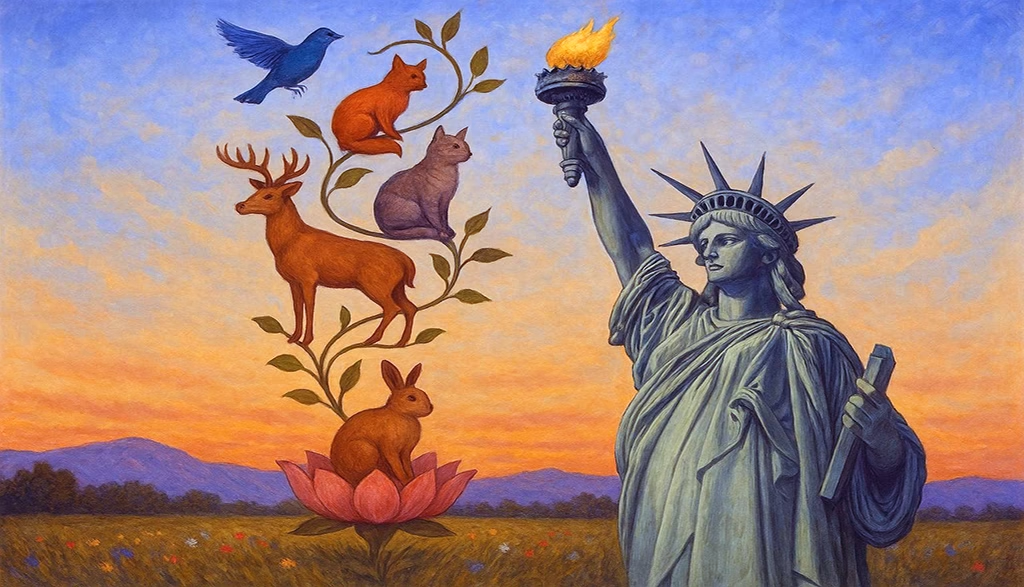Reading Time: 3 minutes
Content
The Moral Order, and the sacred Pulse of Choice
In a world increasingly engineered by algorithms and bureaucracy, the word “natural” stands as both a whisper and a roar. It is not merely a descriptor—it is a philosophy, a rhythm, a rebellion. “Natural” evokes biology and instinct, yes, but also authenticity, moral order, and the sacred pulse of choice.
When applied to systems like capitalism, “natural” implies something unforced. Not perfect, but organic. Capitalism, in its purest form, mirrors the human impulse to trade, to create, to risk. It is the barter of ideas, the dance of incentives and the ritual of exchange. It is not imposed—it emerges; not being sterile—it breathes.
Natural Is Not Neutral
To live naturally is to live rhythmically. To eat what the earth offers, to heal with what ancestors knew, to dress in fibers that speak of soil and sun. But natural is not passive. It is active, alive, and deeply political. It resists control and it resists artificiality; resisting the bureaucratic impulse to flatten vitality into spreadsheets and regulations.
Today, somewhere, someone is choosing control over prosperity. Choosing surveillance over spontaneity. Chose the synthetic over the soulful. And some applauded. But applause does not sanctify. It only echoes.
The Ritual of Natural Living
To embrace a natural lifestyle is to reclaim sovereignty. It is to choose herbs over chemicals, rituals over routines, and freedom over fear. It is to reject the artificial not with anger, but with elegance. With compost and poetry and with trade that honors the maker. With commerce that carries meaning.
Natural living is not nostalgic—it is prophetic. It looks forward by looking inward and asks not “What is trending?” but “What is true?” It is the soil beneath our feet and the fire in our belly. It is the capitalism of kinship, not conquest. The economy of dignity, not domination.
Capitalism as Ceremony
To begin, let us not confuse capitalism with corporatism. Whereas capitalism arises naturally from human exchange, corporatism is deliberately engineered. On one hand, capitalism can serve as a ceremony of exchange; on the other, corporatism often simulates control. Consequently, when capitalism is stripped of its poetic essence, it devolves into a machine. However, when it is infused with ritual, ethics, and story—it transforms into something sacred.
Therefore, at The Natural Memo, we embrace capitalism as ceremony. We see trade as tribute, and branding as storytelling. In this spirit, we believe every product should carry a poem, every label a lineage, and every transaction a truth.
Communism is Artificial
From its very inception, communism emerged as an artificial construct—frequently enforced through violence. Rather than choosing their leaders, populations were pressured to accept unelected regimes. Although these governments often claimed noble intentions, they consistently failed to implement practical strategies that could uphold human dignity or promote genuine prosperity.
Consider the Soviet Union: it stands as a stark illustration of communism’s collapse. Similarly, Cuba’s shift toward communism lacked coherent justification. While the revolution initially carried noble aspirations, those ideals were soon exchanged for superficial perks—like free condensed milk—while power became entrenched in the hands of a privileged few, indefinitely.
Together, these examples underscore the deep and lasting consequences of imposing systems that disregard organic social evolution and human dignity.
Conclusion: The Natural Memo
Let this be a memo to the world: Natural is not a trend. It is a return, “a back to natural movement”. A return to rhythm, to freedom, to the sacred dance of exchange. Let us live naturally—not just in what we consume, but in how we choose. Let us resist the artificial not with protest, but with poetry. Not with outrage, but with offering.
Because the natural is not neutral. It is the foundation from which freedom flourishes.
Other Interesting Articles
Natural Wellness for Mindful Living and Healing
Transforming Campus Disputes through Intellectual Engagement




